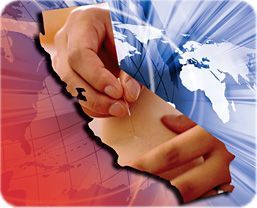As modern medical standardization continues, the field of traditional Chinese medicine has the advantage of comprehensive personalization. For rare or complex cases, deeper consideration of constitution is invaluable. Proper constitutional assessment, especially with first-time clients, can guide desirable and predictable outcomes. This leads to a higher rate of return, and greater trust between you and your patient.
Averting an AOM Disaster in California
In a down-to-the-wire thriller reminiscent of his action-hero days, California Governor Arnold Schwarzenegger kept matters on edge until the very last minute, threatening to veto the 2009 state budget, which was already 85 days overdue. Of course, also in the tradition of the best Hollywood action films, it all worked out in the end when the governor signed the budget on Sept. 23, 2008.
In addition to being a nail-biter for state agencies anxiously wondering if they would have money to pay their employees, the delayed budget was also a cause of great concern to acupuncturists who treat patients under Medi-Cal, the state Medicare plan. Without Medi-Cal funding, this could have potentially left an estimated 6.5 million people in the state of California without access to acupuncture as provided under Medi-Cal's "optional benefits" program.
Ironically, the fight was not even over Medicare, but rather over whether or not to tax wealthy corporations and individuals in addition to cuts to the state budget, all in an effort to close the state's $15.2 billion deficit. As one might expect, Republicans were opposed to the taxes, while Democrats favored them. The new budget approved by the state legislation includes $7.1 billion in spending cuts - but these cuts do not impact access to acupuncture through Medi-Cal. Schwarzenegger then trimmed another $510 million through line-item vetoes.

Gov. Schwarzenegger signed the bill in his office rather than in the State Rotunda, as is more common, stating that the signing was not a cause for celebration because it had come so late. "Why I didn't feel like celebrating in the rotunda is that it is inexcusable to have a budget that's three months late," he told the press. "It's three months late because both of the parties stayed in their ideological corners and refused to come out."
The events leading up to the budget signing are themselves full of cinematic plot twists and turns. After the governor had threatened to veto the budget in the middle of September, a legislative override looked to be imminent. The override would have required a two-thirds majority vote. In response to the possibility of an override, Schwarzenegger then threatened to veto any bills that were sitting on his desk awaiting signature. Of course, any legislative override would have further delayed Medicare reimbursements while the budget remained in limbo.
Fortunately, the Medical optional benefits and access to acupuncture care were never "central to the battle," according to Bill Mosca, executive director of the California State Oriental Association (CSOMA), in an interview with Acupuncture Today. CSOMA has led the legislative lobbying battle to preserve access to acupuncture for California residents on Medi-Cal. Mosca added that the optional Medicare benefits are "safe for this fiscal year from July 2008 to July 2009." In addition, the 10 percent reimbursement cut made effective July 1, 2008, will be rescinded at the end of February 2009, after which reimbursement rates will return to their previous levels.
Mosca's take is that, despite all of the budget wrangling over Medicare, the optional benefits are just a miniscule amount of the overall state budget. "Really, it's just background noise. Will it really save that much from the budget?" He added that the result of cutting Medicare benefits, including the optional ones, could be disastrous. "If you impose Medicare cuts, it will drive up costs. People will end up going to the emergency room for non-urgent cases instead of seeing a regular doctor."
Although for the time being, this has not come to pass, this whole budget process will have to be hashed out again for the following year. Mosca cautioned, "This whole thing could certainly happen again next year."


